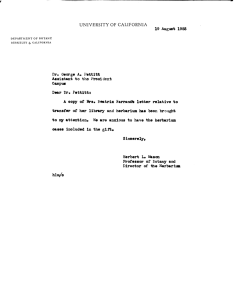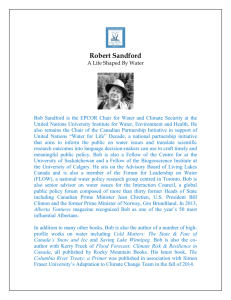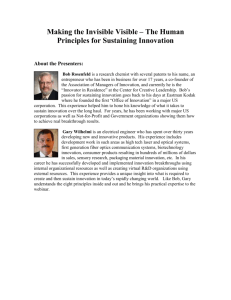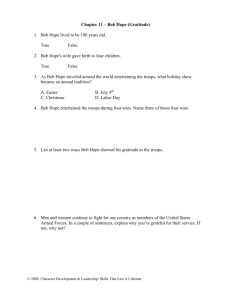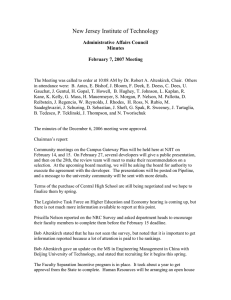Obituary
advertisement
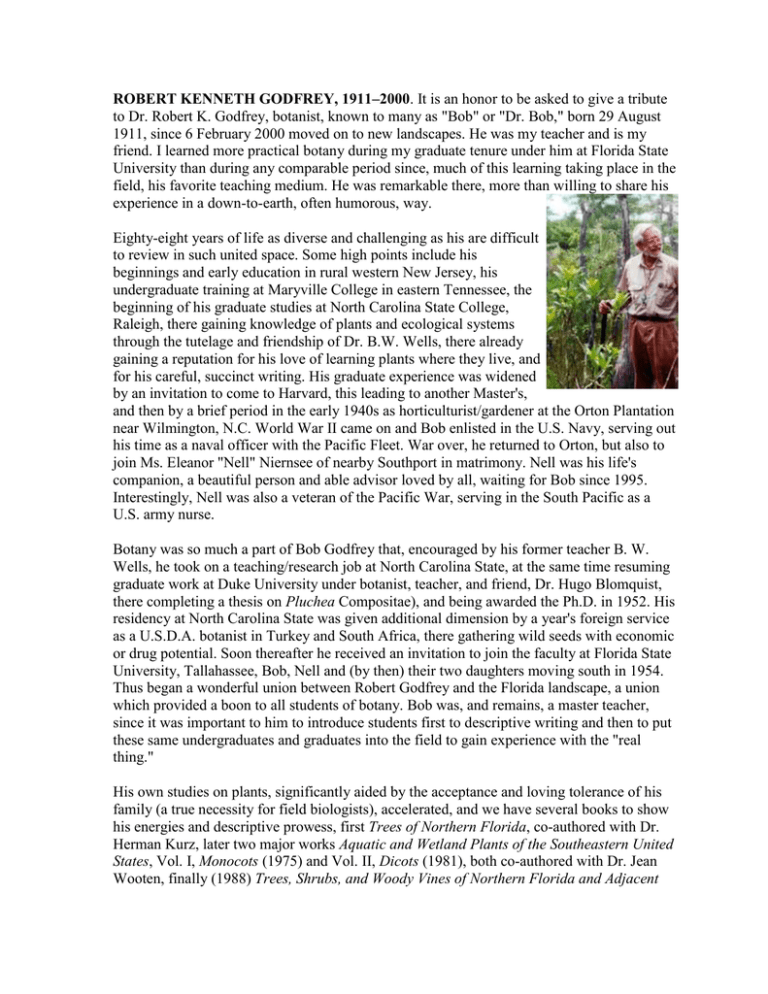
ROBERT KENNETH GODFREY, 1911–2000. It is an honor to be asked to give a tribute to Dr. Robert K. Godfrey, botanist, known to many as "Bob" or "Dr. Bob," born 29 August 1911, since 6 February 2000 moved on to new landscapes. He was my teacher and is my friend. I learned more practical botany during my graduate tenure under him at Florida State University than during any comparable period since, much of this learning taking place in the field, his favorite teaching medium. He was remarkable there, more than willing to share his experience in a down-to-earth, often humorous, way. Eighty-eight years of life as diverse and challenging as his are difficult to review in such united space. Some high points include his beginnings and early education in rural western New Jersey, his undergraduate training at Maryville College in eastern Tennessee, the beginning of his graduate studies at North Carolina State College, Raleigh, there gaining knowledge of plants and ecological systems through the tutelage and friendship of Dr. B.W. Wells, there already gaining a reputation for his love of learning plants where they live, and for his careful, succinct writing. His graduate experience was widened by an invitation to come to Harvard, this leading to another Master's, and then by a brief period in the early 1940s as horticulturist/gardener at the Orton Plantation near Wilmington, N.C. World War II came on and Bob enlisted in the U.S. Navy, serving out his time as a naval officer with the Pacific Fleet. War over, he returned to Orton, but also to join Ms. Eleanor "Nell" Niernsee of nearby Southport in matrimony. Nell was his life's companion, a beautiful person and able advisor loved by all, waiting for Bob since 1995. Interestingly, Nell was also a veteran of the Pacific War, serving in the South Pacific as a U.S. army nurse. Botany was so much a part of Bob Godfrey that, encouraged by his former teacher B. W. Wells, he took on a teaching/research job at North Carolina State, at the same time resuming graduate work at Duke University under botanist, teacher, and friend, Dr. Hugo Blomquist, there completing a thesis on Pluchea Compositae), and being awarded the Ph.D. in 1952. His residency at North Carolina State was given additional dimension by a year's foreign service as a U.S.D.A. botanist in Turkey and South Africa, there gathering wild seeds with economic or drug potential. Soon thereafter he received an invitation to join the faculty at Florida State University, Tallahassee, Bob, Nell and (by then) their two daughters moving south in 1954. Thus began a wonderful union between Robert Godfrey and the Florida landscape, a union which provided a boon to all students of botany. Bob was, and remains, a master teacher, since it was important to him to introduce students first to descriptive writing and then to put these same undergraduates and graduates into the field to gain experience with the "real thing." His own studies on plants, significantly aided by the acceptance and loving tolerance of his family (a true necessity for field biologists), accelerated, and we have several books to show his energies and descriptive prowess, first Trees of Northern Florida, co-authored with Dr. Herman Kurz, later two major works Aquatic and Wetland Plants of the Southeastern United States, Vol. I, Monocots (1975) and Vol. II, Dicots (1981), both co-authored with Dr. Jean Wooten, finally (1988) Trees, Shrubs, and Woody Vines of Northern Florida and Adjacent Georgia and Alabama. These opuses have in common what in the view of many constitute some of the best descriptive work ever published on plants. To me it is of interest that the last three volumes were published after Bob's "retirement." And, in addition to the books were countless other articles on plants, together with service in teaching, administration, even a tour with the National Science Foundation. There are many definitions for "success." Godfrey to me remains a superior example. He loved his family, he loved his work, he was a true and honest witness. He was interested in all who had an interest in plants, and helpful friend to all who sought true competence. He will be remembered as a scholar who taught much through friendly conversation, and as one who knew how to read a landscape. Some will remember him through study of the tens of thousands of examples of plants he collected, most of them in the herbarium he built at FSU carefully documented, processed, and curated by himself. His caring approach is perhaps one of the best ways to remember him, since he was, after all, a curator, therefore a part of that endangered breed of individuals who know that specimens are indisputable facts that will always provide a necessary confrontation with truth. He will be remembered lovingly by family and friends, each with their own special memories. My own is to think of him. walking through some big, blazing summer or autumnal savanna, this shimmering and varicolored with an abundance of wildflowers, with Bob waving us on, inviting us to see the miracle. In Bob's memory, "The Robert K. Godfrey Endowment for the Study of Botany" has been established at FSU. The fund is to be used to support field and herbarium studies in botany, specifically to include: 1) support of the FSU Herbarium for enhancement and maintenance of the Collection, such as matching support for part-time curatorial assistance; and 2) sponsorship of independent research in the-field of botany and plant ecology for both students and faculty, such as systematic/taxonomic studies, botanical inventory, rare plant surveys, and studies in plant ecology or plant conservation biology. If needed, the FSU Foundation address is 225 University Center, Building C, Suite 3100, Tallahassee, Florida 32306-2660; phone 850 644-6000; fax 850 644-6211).— Robert Kral From American Society of Plant Taxonomists Newsletter, volume 15, June 2001.
